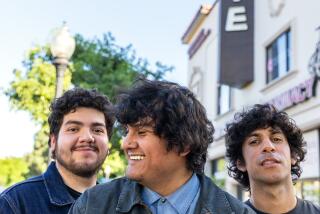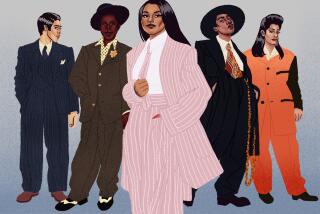Zoot Suit Tootin’
- Share via
The recent resurgence in swing music has been mainly a club-bound phenomenon, but one ensemble has made the leap from the bandstand to the Billboard charts with the unlikeliest of songs--a breezy account of the infamous Zoot Suit Riots, the 1943 episode in which sharply dressed young Mexican Americans were assaulted by civilians and soldiers on leave in the streets of downtown Los Angeles.
Nearly a year after its initial release, Eugene, Ore.’s, Cherry Poppin’ Daddies’ debut album, “Zoot Suit Riot,” has sold nearly 300,000 copies, primarily because the title song has caught on with modern-rock radio programmers--a situation even CPD’s frontman Steve Perry finds a bit curious.
“I never expected us to get signed to a label, let alone sell any records,” Perry says. “When we first started out, no one was really paying any attention to swing music, but now it’s come around.”
A blowzy, horn-driven finger-popper, “Zoot Suit Riot”--which is No. 43 and rising on Billboard’s Hot 100 airplay chart--was inspired by Perry’s fascination with L.A.’s wartime Latino culture.
“If you ever look in certain old magazines, you can see these people wearing these stylish zoot suits, but wearing them was considered an anti-American act, ‘cause of the textile rations at the time,” Perry says. “They were castigated for it. . . . Of course, it was also a racist thing.”
The 1943 beatings also inspired Luis Valdez’s acclaimed 1978 stage play “Zoot Suit” and a subsequent movie version, and while the Cherry Poppin’ Daddies’ song has resonated with the Latino community, Perry’s real intention was to pay homage to the zoot suiters: “I don’t mind if people take it as a Latino anthem, but I was just trying to pay tribute to this new breed of swingers that was emerging. I just like stylish people.”
A former track and field athlete at the University of Oregon, Perry was originally drawn to punk rock, until he determined it was a musical dead-end.
“I’m a classicist, not a nihilist,” he says. “Banging out three chords can only get you so far. There’s something to be gained from trying something hard. We just try to marry some of that punk energy to what we do.”
More to Read
The biggest entertainment stories
Get our big stories about Hollywood, film, television, music, arts, culture and more right in your inbox as soon as they publish.
You may occasionally receive promotional content from the Los Angeles Times.










